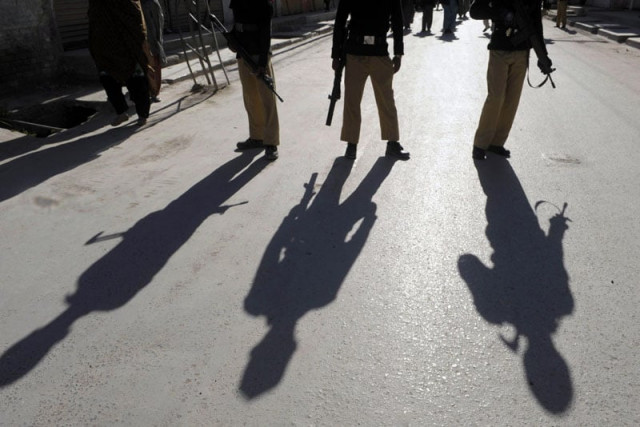Capacity-building: Police say UNODC training helped curb Khanewal crime
DPO says junior cops preferred for training on better investigation.

“The training has changed the narratives of investigation. Credible evidence helps ensure a balance, impartial and unbiased investigation,” said Sub-Inspector Hamid Ata. PHOTO: AFP
The incidence of crime had substantially decreased in Khanewal after police officials trained by the United Nations Office on Drugs and Crime (UNODC) had resumed duties in their respective areas, the district police chief said.
Khanewal District Police Officer (DPO) Rana Ayaz said that UNODC had trained 100 police officials in Khanewal to help them check crime and improve the standard of investigation. The UN body would train 300 district police officials.
“A select group of policemen are trained 14 hours, three days a week,” the DPO told The Express Tribune. The training focuses on junior police officials.

“After the training, they are sent to the field and their performance evaluated,” Ayaz said. “They are informed about techniques to improve their investigation.” He said the officials later applied the techniques they had learnt and had quashed around 900 bogus FIRs. He said police officials had shown a keen interest in the programme. “Young policemen are more enthusiastic and willing to avail this opportunity,” he said.
Inspector Rizwan Pahor is among the 100 men trained by the UNODC. He said: “I have now realised why the people declared criminals by us are often released by courts. There were some deficiencies in our investigation methods. They have been removed,” he said.
“The training has changed the narratives of investigation. Credible evidence helps ensure a balance, impartial and unbiased investigation,” said Sub-Inspector Hamid Ata, another trainee.
Ishaq Fani, Bahauddin Zakariya University Distant Learning Department director, believes the training would help improve police’s image.
“The best part of the training programme is the focus on lower-rank police officials. They are the ones who are in a direct contact with the people. Their behaviour towards the public accounts for the repute of the entire police department.”

Fani said the experience of trainee police officials would be shared with the students of the university’s Criminology Department.
“We plan to seek guidance from Khanewal police and the UNODC in order to educate the students of the Criminology Department about modern techniques of investigation and crime control,” he said.
Members of civil society organisations praised the district police for joining hands with the UNODC.
Hamayun Khan, a social activist, said the graph of crime had come down in several areas of the city.
“A trained and civilised police force is imperative for a healthy society,” said Khan. “Incidents of robbery have declined since the training began,” he said. He said the police had now established a closer liaison with citizens. “They are also relying on modern techniques to investigate cases.”
Published in The Express Tribune, May 28th, 2014.



















COMMENTS
Comments are moderated and generally will be posted if they are on-topic and not abusive.
For more information, please see our Comments FAQ